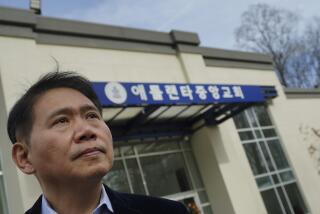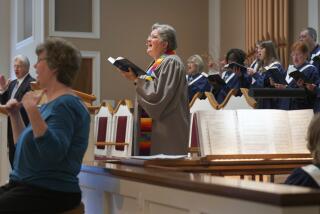New Chapter in Feud With IRS Goes to Court
- Share via
ORLANDO, Fla. — Three former Orlando residents are on trial in U.S. District Court on charges of conspiring to defraud the Internal Revenue Service by recruiting church members to the controversial Universal Life Church and advising them how to write off much of their income.
“The theme of the overt acts in this trial is ‘there is a sucker born every minute,’ and in Central Florida . . . there were a number of suckers,” Bruce Hinshelwood, a federal prosecutor, told the jury in the trial of Scott Slayback Jr., 60, William Wakeman Jr., 46, and David Hurley, 54.
Dentists, schoolteachers and principals, housewives, executives and salesmen paid up to $1,500 to join the Modesto, Calif.-based church, which has been locked in a feud with the IRS nationwide for more than a decade.
Members were told they could write off half or all of their income by donating it to church chapters they formed, Hinshelwood said.
At the heart of the case are federal laws granting tax-exempt status to churches. The Universal Life Church, founded in 1962 and claiming 13 million members, had such status from 1973 until it was revoked in 1984.
One of the key witnesses against the three defendants is an undercover IRS investigator identified by the prosecutor as St. Paul. The investigator, Paul Lester, was among many Central Florida residents who joined the church and for a fee became a minister, a bishop or a saint, Hinshelwood said.
Slayback, a financial consultant, was indicted last February on one count of conspiracy and 44 counts of aiding and abetting in the filing of fraudulent tax returns.
Wakeman, now from Marietta, Ga., and Hurley, of Greenville, S.C., were charged with conspiring with Slayback to defraud the IRS from 1979 to 1987 in Orange, Seminole and Lake counties.
The government alleges the three also told members to use pens with light blue ink when writing checks so they could not be properly photocopied by the IRS and not to cooperate with the IRS. Slayback also offered to represent taxpayers if they were audited by the IRS, the prosecutor said.
But court-appointed lawyers for the three claim the case involves tax avoidance, not tax evasion. This refers to the legitimate use of tax shelters and loopholes to minimize the amount of taxes owed the government.
More to Read
Sign up for Essential California
The most important California stories and recommendations in your inbox every morning.
You may occasionally receive promotional content from the Los Angeles Times.










